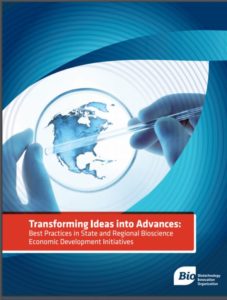Every two years, the Biotechnology Innovation Organization (BIO) publishes a biennial BIO Economic Development Best Practices Report that catalogs state and regional economic development initiatives. The best practice examples contained within this report highlight the critical facets that foster high-performing industry and the long-term success it has maintained. The report reaffirms that successful industry development initiatives are built upon the following four key building blocks for company creation and expansion:

This fifth biennial BIO Economic Development Best Practices Report is a catalog of state and regional economic development initiatives. The best practice examples contained within this report highlight the critical facets that foster high-performing industry and the long-term success it has maintained. (Click the image to view the report.)
• Access to angel and venture capital
• Workforce development initiatives
• Technology Transfer Systems
• State of the Art facilities
Investments in these 4 areas yield results. The bioscience industry’s total economic impact on the U.S. economy, as measured by overall output, totaled $2 trillion in 2016. This impact is generated by the direct output of the bioscience industry combined with the indirect (supply chain) and induced (employee spending) impacts.
Arizona’s contribution to this economic impact in 2016 was $23.16 billion as calculated by AZBio based on Arizona’s percentage of the national wage and employment data.
According to the report, the following select state economic development measures continue to represent the substantial level of support so vital for growth of the bioscience industry.
- 21 states offer matching grants for Phase I and/or II Small Business Innovation Research (SBIR) grants to accelerate early stage company development. An increase from 16 states in 2017. (Arizona does not yet offer this.)
- 27 states offer tax credits to angel investors who invest in technology companies including the biosciences. An increase from 25 states in 2017. (Including Arizona)
- 39 states offer sales tax exemptions on equipment for both research and development (R&D) and manufacturing with several exemptions specifically for biomanufacturing. One additional state has joined the ranks this year – up from 38 states in 2017. (Including Arizona)
- 22 states invest state dollars in private venture capital firms that fund small and emerging bioscience companies. This is an increase from 21 states in 2017. (Arizona has not done this.)
- 38 states offer R&D tax credits for early stage research (Including Arizona)
While there are two key programs that Arizona does not have at this time, the report highlights Arizona’s $1 billion bonding initiative for university research infrastructure.
“In 2017 the State of Arizona passed legislation that provides state bonds to expand, and maintain university research
infrastructure at Arizona public universities. The measure establishes a University Capital Infrastructure Fund with
subsets for each university and prescribes a formula to calculate amounts appropriated to each university fund for
2019 and beyond.” (2019 BIO Economic Development Best Practices Report )
Addressing Arizona’s Risk Capital Challenge
Arizona has made great progress since the formation of our Bioscience Cluster in 1997 and the launch of the Arizona Bioscience Roadmap in 2002.
By conservative estimates, over $19 billion has been invested in Arizona’s bioscience and healthcare sector by public and private sources over the last two decades. We have built up our research enterprise, are launching exciting companies, and are educating the next generation of bioscience leaders. Yet, one major hurdle still must be crossed. Lack of access to early stage life science capital has plagued Arizona for two decades.
AZBio is leading an initiative to address Arizona’s risk capital challenge with the support of a grant from the U.S. Economic Development Administration. AZBio and its partners will build and sustain the Arizona Bioscience Cluster Sustainable Seed Fund Project. The project will help close the funding gap for early-stage life science and healthcare technology companies in the region’s bioscience cluster by creating a new and sustained flow of equity-based funding in a state that has lacked available capital from local institutional investors since 2006.
The project will also provide resources and technical assistance to help prepare these companies for their initial funding process as well the follow-on funding they will likely need in the future. The availability of additional, local capital through the new seed fund will enable select companies to achieve milestones and fuel their growth. These companies in turn will enhance the long-term economic vitality of the region by attracting additional private investment to the region, creating and sustaining high-paying jobs, and furthering the entrepreneurial culture arising from the cluster’s growth.
The resulting fund, Healthcare Impact Foundation (AZ-HCIF), is designed to provide sustainable funding to support the progression of Arizona-based life science discoveries along a path from development to delivery.
In June of 2019, AZBio and its partners completed a 3-month series of interviews with leaders from inside and outside of Arizona. Inputs from these interviews will form the foundation of the AZ-HCIF Capital Campaign Study that will be released in September, 2019.
